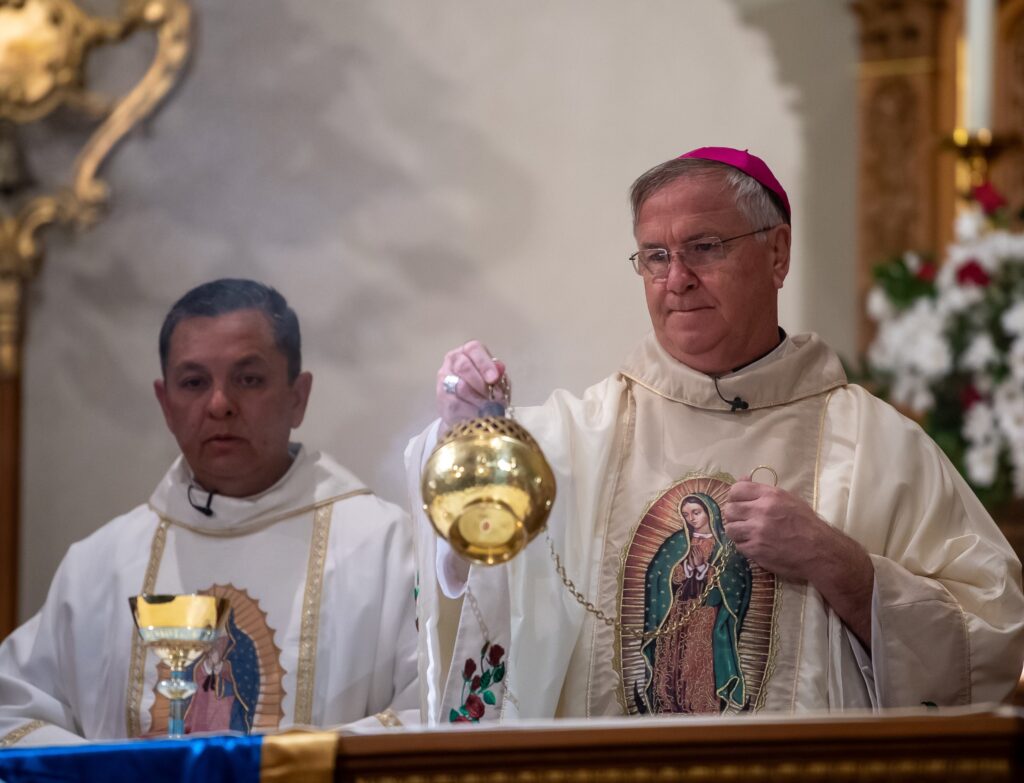
Frequently Asked Questions
A notable feature of the pilgrimage sites is the Peace Pole, an 8-foot-tall pole embossed with the words “May Peace Prevail on Earth” in multiple languages—including English, Spanish, Vietnamese, Tagalong, Hebrew, Aramaic, Polish, O’odham (an Indigenous language of central and southern Arizona) and Ukrainian—which is planted in the ground outside each of the designated jubilee pilgrimage sites.
This tradition is part of the Peace Pole Project, which was founded in 1955 in Japan and has spread to almost every country in the world. Before each Jubilee opening Mass, Bishop Dolan blessed the Peace Pole and processed with the congregation into the church.
A plenary indulgence is a great gift and mercy from the Church, and a powerful way to receive grace for the remission of sins. Bishop Dolan has decreed six pilgrimage sites during the Jubilee Year – a visit to one or more of these sites provides the opportunity to obtain an indulgence, provided that the necessary conditions are met.
The following “General remarks on Indulgences” from Gift of the Indulgence summarizes the usual conditions given in the Church’s law (cf. Apostolic Penitentiary, Prot. N. 39/05/I):
- This is how an indulgence is defined in the Code of Canon Law (can. 992) and in the Catechism of the Catholic Church (n. 1471): “An indulgence is a remission before God of the temporal punishment due to sins whose guilt has already been forgiven, which the faithful Christian who is duly disposed gains under certain prescribed conditions through the action of the Church which, as the minister of redemption, dispenses and applies with authority the treasury of the satisfactions of Christ and the saints”.
- In general, the gaining of indulgences requires certain prescribed conditions (below, nn. 3, 4), and the performance of certain prescribed works ….. [in this case, those granted for the Feast of Mercy]
- To gain indulgences, whether plenary or partial, it is necessary that the faithful be in the state of grace at least at the time the indulgenced work is completed. [i.e. one must be a Catholic, not excommunicated or in schism.]
- A plenary indulgence can be gained only once a day. In order to obtain it, the faithful must, in addition to being in the state of grace:
- have the interior disposition of complete detachment from sin, even venial sin;
- have sacramentally confessed their sins;
- receive the Holy Eucharist (it is certainly better to receive it while participating in Holy Mass, but for the indulgence only Holy Communion is required);
- pray for the intentions of the Supreme Pontiff.
- It is appropriate, but not necessary, that the sacramental Confession and especially Holy Communion and the prayer for the Pope’s intentions take place on the same day that the indulgenced work is performed; but it is sufficient that these sacred rites and prayers be carried out within several days (about 20) before or after the indulgenced act. Prayer for the Pope’s intentions is left to the choice of the faithful, but an “Our Father” and a “Hail Mary” are suggested. One sacramental Confession suffices for several plenary indulgences, but a separate Holy Communion and a separate prayer for the Holy Father’s intentions are required for each plenary indulgence.
- For the sake of those legitimately impeded, confessors can commute both the work prescribed and the conditions required (except, obviously, detachment from even venial sin).
- Indulgences can always be applied either to oneself or to the souls of the deceased, but they cannot be applied to other persons living on earth.
Pope Francis has declared a Jubilee Year, December 24, 2024 – January 6, 2026, with a special emphasis on Romans 5:5, “hope does not disappoint,” and the theme “pilgrims of hope.”
In tandem with the Holy Father, the first year of Bishop Dolan’s pastoral plan on evangelization is themed “Year of Hope.” The Jubilee Year and the first year of Bishop Dolan’s pastoral plan overlap in theme, while Bishop Dolan’s pastoral plan, which begins in January 2025, will continue until December 9, 2031 – the 500th anniversary of Our Lady’s apparitions on Tepeyac hill. Each year of Bishop Dolan’s pastoral plan will carry a unique theme and emphasis related to evangelization.
Bishop Dolan has decreed the following Diocese of Phoenix parishes as Jubilee Sites during the 2025 Jubilee Year:
Ss. Simon and Jude Cathedral
6351 N 27th Ave, Phoenix, AZ 85017
St. Mary’s Basilica
231 N 3rd St, Phoenix, AZ 85004
St. Anthony
47 Sacaton Rd, Sacaton, AZ 85147
St. Mary
302 E Spring St, Kingman, AZ 86401
Sacred Heart
150 Fleury St, Prescott, AZ 86301
Chapel of the Holy Cross
780 Chapel Rd, Sedona, AZ 86336
Read Bishop Dolan’s decree designating Jubilee Sites within the Diocese of Phoenix for the 2025 Jubilee Year.
Jubilee Years decreed by the pope are rooted in Scripture, particularly the book of Leviticus. Every 50 years, God commanded the chosen people to live a year of restoration – slaves were set free, debts forgiven and land was restored to its rightful owners.
Today, the Church celebrates Jubilee Years every 25 years and on other special occasions with a special emphasis on the reality that God desires to forgive our debts, free us from the slavery of sin and restore the land of our hearts.
Pope Francis has declared a Jubilee Year, December 24, 2024 – January 6, 2026, with a special emphasis on Romans 5:5, “hope does not disappoint,” and the theme “pilgrims of hope.”
Bishops are first and foremost pastors. Their primary duty is to shepherd the faithful toward a closer relationship with Jesus Christ. One of the primary ways in which they do this is by writing letters on some aspect of the faith. Just as the Holy Father writes letters to the bishops, clergy and faithful of the worldwide Church, a local bishop periodically writes letters to his priests and to the faithful of his diocese.
In October 2024, Bishop Dolan released his first pastoral letter, “TILMA” to introduce his seven-year pastoral plan on evangelization in the Diocese of Phoenix. He will continue to write pastoral letters annually throughout the seven-year plan.
